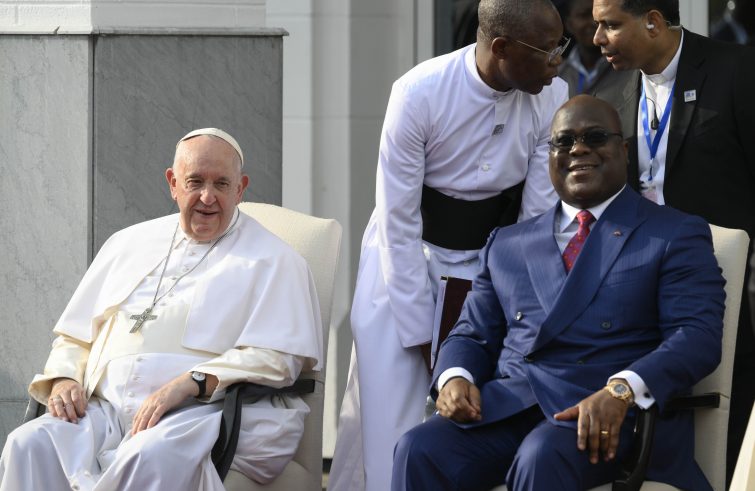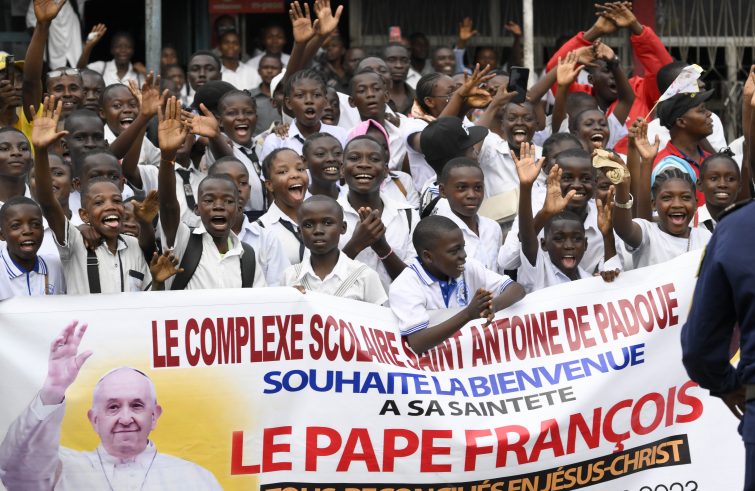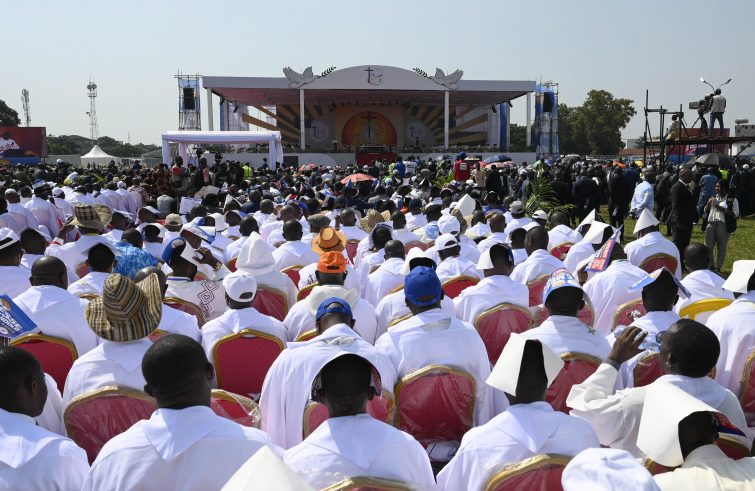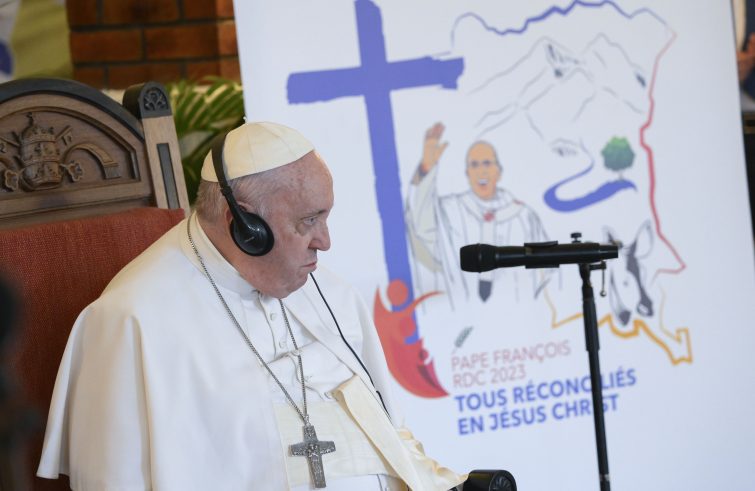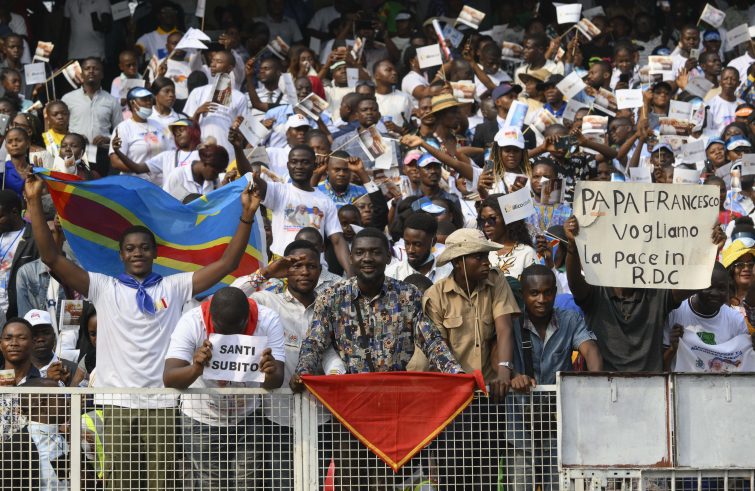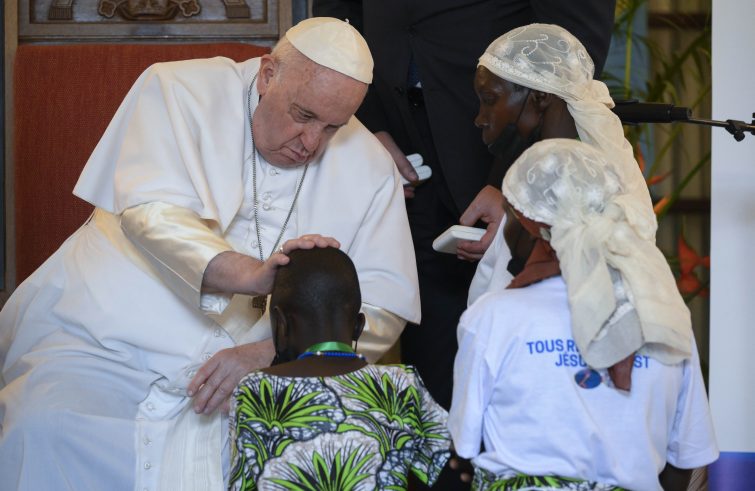
Emelda is not fluent in French; her testimony was read by another woman. When she was 16, she was held captive as a sex slave and sexually abused for three months. “Every day five to ten men abused each one of us. They forced us to eat corn mush and the flesh of the men they killed. Sometimes they would mix human skulls with cattle meat. That was our daily meal. Those who refused to eat it were slaughtered and everyone else was forced to eat them.” This is but one of the horrifying accounts the Pope listened to, in silence, during his meeting with the victims of violence in the east of the country, where he was prevented from travelling for security reasons. Women in particular are the ones who spoke out, like Bijoux, repeatedly raped every day for 19 months, since she was 14 years-old, by the commander of a rebel militia that arrived in her village. As she spoke, she held her two twins in her arms, the fruit of that violence, tenderly caressed by the Pope. It marked the most moving moment of Francis’ three-day visit to the Democratic Republic of Congo: victims of war, armed conflict and hatred placed several symbolic objects that represented the atrocities they had been subjected to – a machete, a knife, a spear, the guerrillas’ uniform, the mat where the abuses were perpetrated – at the foot of a crucifix placed before the Pope to show that it is possible to forgive, even when faced with the most dehumanising atrocities, provided we “demilitarise our hearts”, as the Pope asked in his speech, exhorting every inhabitant of the country to become a responsible builder of their future, saying “yes” to reconciliation and saying “no” to resignation.
“May women, every woman, be respected, protected and esteemed”,
the Pope said in final appeal addressed to all victims of violent strife: “Violence against women and mothers is violence against God himself, who from a woman, from a mother, took on our human condition.”
“Silence your weapons, put an end to war. Enough! Stop getting rich at the cost of the poor, stop getting rich from resources and money stained with blood!”.
- (Foto Vatican Media/SIR)
- (Foto Vatican Media/SIR)
Sharing his tears with those of the victims, the Pope recalled the commitment of the “sowers of hope” – such as Ambassador Luca Attanasio, military police officer Vittorio Iacovacci and driver Mustapha Milambo, killed two years ago in the eastern part of the country – and reiterated the appeal he made in his first speech, pronounced at the Palais de la Nation in Kinshasa and addressed to those who “orchestrate war”. What is needed is “to disarm the heart”, in a world discouraged by violence and war:
“May Africa, the smile and hope of the world, count for more. May it be spoken of more frequently, and have greater weight and prestige among the nations! We cannot grow accustomed to the bloodshed that has marked this country for decades, causing millions of deaths that remain mostly unknown elsewhere. Hands off the Democratic Republic of the Congo! Hands off Africa!”.
The meeting at the nunciature was preceded by Holy Mass at “Ndolo” Airport, before a crowd of over a million people.
“We Christians are called to cooperate with everyone, to break the cycle of violence, to dismantle the machinations of hatred”,
the Pope’s invitation to be “missionaries of peace.”
“Let us receive forgiveness from God and in turn forgive one another!”,
the Pope said with respect to the central theme of the journey, mentioned in the very first speech, and in his address to the clergy, whom he invited to engage in “dialogue, acceptance and forgiveness”, to “make rivers of peace flow through the arid plains of violence.” Forgiveness was also the focus of his closing remarks, added off text, in his address to the bishops before departing for South Sudan, the second leg of his 40th apostolic journey, where he will be joined by the Archbishop of Canterbury, Justin Welby, and the Moderator of the General Assembly of the Church of Scotland, Iain Greenshields. For sure, of the many highlights of his visit, the Pope will cherish in his heart the crowd of 65,000 young people, who sang and danced at Martyrs’ Stadium, whom he asked, in unscripted remarks, to shake hands with one another to experience fraternity.
- (Foto Vatican Media/SIR)
- (Foto Vatican Media/SIR)
- (Foto Vatican Media/SIR)
“Pas de corruption!”,
the Pope exclaimed in French. “If someone offers you a bribe, or promises you favours and lots of money, do not fall into the trap. Do not be deceived; do not be sucked into the swamp of evil. Do not be overcome by evil! Overcome evil with good!”. Francis sent a strong and clear message at the end of the first leg of his journey. Addressing the bishops of the Democratic Republic of Congo, the Pope thus described their role as peacemakers, which, he pointed out, is not political action, rather it means:
“to pluck up the poisonous plants of hatred and selfishness, anger, resentment and violence;
to break down the altars erected to money and corruption; to build a coexistence based on justice, truth and peace; and finally, to plant the seeds of rebirth, so that tomorrow’s Congo will truly be what the Lord dreams of: a blessed and happy land, no longer exploited, oppressed and drenched in blood.”

